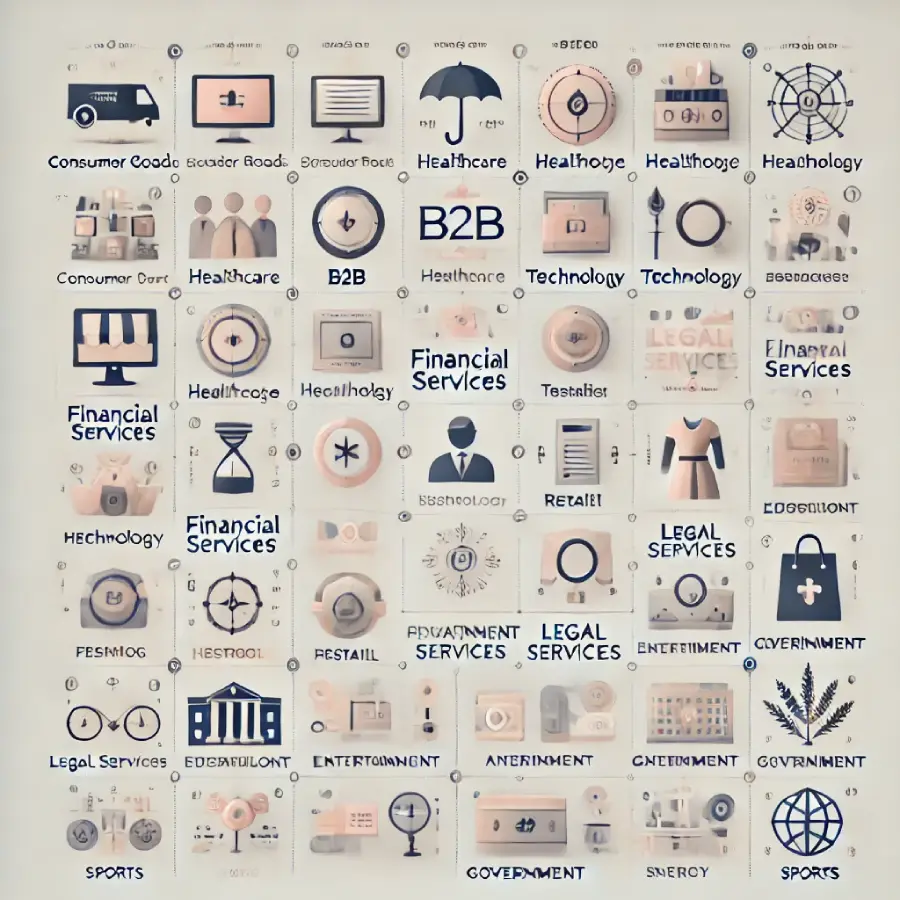Marketing application fields refer to the various industries, sectors, and contexts where marketing principles are applied to achieve specific objectives. Different fields may require specialized marketing approaches, given their unique audiences, regulatory requirements, and goals. Here’s a detailed look at some primary fields of marketing application:
1. Consumer Goods Marketing
- Focus: Products directly sold to consumers, such as food, clothing, electronics, and personal care items.
- Strategies: Often involves mass marketing through TV, social media, and in-store promotions, emphasizing brand differentiation and customer loyalty.
- Goal: Build brand awareness, drive sales, and encourage repeat purchases.
2. Business-to-Business (B2B) Marketing
- Focus: Marketing products or services to other businesses rather than individual consumers.
- Strategies: Includes relationship-based approaches like account-based marketing (ABM), personalized email marketing, industry conferences, and white papers.
- Goal: Establish long-term partnerships, demonstrate value, and solve specific business problems.
3. Healthcare Marketing
- Focus: Promoting healthcare services, pharmaceuticals, medical devices, and wellness products.
- Strategies: Patient education, compliance with regulatory standards, digital platforms, physician referrals, and content-driven campaigns.
- Goal: Increase patient engagement, build trust, and provide accurate health information.
4. Financial Services Marketing
- Focus: Banking, insurance, investment services, and personal finance products.
- Strategies: Often employs trust-building and informational approaches like blogs, webinars, financial literacy programs, and personalized advertising.
- Goal: Build brand credibility, attract clients, and enhance customer loyalty.
5. Technology and Software Marketing
- Focus: Promoting technology solutions like SaaS, hardware, cloud services, and applications.
- Strategies: Product demos, case studies, free trials, webinars, and digital advertising. Emphasis is often placed on showcasing unique features and technical advantages.
- Goal: Educate potential users, highlight unique capabilities, and drive conversions.
6. Education Marketing
- Focus: Schools, colleges, universities, and online learning platforms.
- Strategies: Digital marketing through social media, educational content, virtual open days, and email newsletters. Targeting both students and parents is common.
- Goal: Attract prospective students, improve enrollment rates, and enhance brand reputation in the educational sector.
7. Hospitality and Tourism Marketing
- Focus: Hotels, travel agencies, airlines, and destinations.
- Strategies: Social media marketing, influencer partnerships, SEO, and location-based promotions to attract tourists and business travelers.
- Goal: Drive bookings, build brand loyalty, and provide memorable experiences to attract repeat visits.
8. Retail Marketing
- Focus: Both brick-and-mortar stores and online retail.
- Strategies: Seasonal promotions, loyalty programs, personalized advertising, in-store experiences, and online reviews.
- Goal: Boost sales, enhance customer experience, and increase foot traffic or online visits.
9. Real Estate Marketing
- Focus: Residential and commercial property sales, rentals, and property management services.
- Strategies: Virtual tours, targeted online ads, open houses, and SEO to attract buyers and renters.
- Goal: Drive property sales or rentals, promote real estate listings, and increase brand visibility for agencies.
10. Nonprofit and Cause Marketing
- Focus: Charities, foundations, and nonprofit organizations promoting social, environmental, or charitable causes.
- Strategies: Storytelling, social media campaigns, influencer partnerships, and donation-driven events.
- Goal: Increase awareness, raise funds, and engage supporters for a specific cause.
11. Fashion Marketing
- Focus: Apparel, accessories, and beauty products.
- Strategies: Social media influencers, fashion shows, collaborations, seasonal campaigns, and trend-focused content.
- Goal: Build brand image, drive product sales, and establish a strong presence in the fashion industry.
12. Entertainment Marketing
- Focus: Movies, music, video games, sports, and other forms of media.
- Strategies: Cross-promotions, influencer partnerships, digital campaigns, and experiential events to generate buzz.
- Goal: Increase audience engagement, generate ticket or merchandise sales, and foster fan loyalty.
13. Agriculture and Food Marketing
- Focus: Food products, farming equipment, and agricultural services.
- Strategies: Nutritional education, compliance with labeling standards, social responsibility campaigns, and influencer marketing.
- Goal: Promote health benefits, build brand reputation, and increase consumer trust in food products.
14. Legal Services Marketing
- Focus: Law firms and legal consultation services.
- Strategies: Content marketing through informative blog posts, local SEO, webinars, and thought leadership.
- Goal: Establish credibility, attract clients, and position the firm as a trusted expert in specific legal areas.
15. Government and Public Sector Marketing
- Focus: Public awareness campaigns, civic services, and policy promotion.
- Strategies: Public service announcements, social media, community events, and educational content.
- Goal: Educate the public, foster trust, and encourage engagement in government programs.
16. Sports Marketing
- Focus: Sports teams, athletes, and related brands.
- Strategies: Sponsorships, endorsements, fan engagement, and live event promotions.
- Goal: Build a fan base, drive ticket and merchandise sales, and enhance brand loyalty.
17. Energy and Utility Marketing
- Focus: Utilities such as gas, electricity, water, and renewable energy.
- Strategies: Educational content on energy conservation, digital campaigns, community events, and green energy incentives.
- Goal: Build trust, promote energy-efficient solutions, and retain customers.
Each field requires tailored marketing strategies and expertise, as the audience needs, regulatory frameworks, and competitive landscapes vary significantly. By understanding and applying field-specific marketing approaches, businesses can effectively reach their target audiences, build stronger relationships, and achieve their strategic goals.

